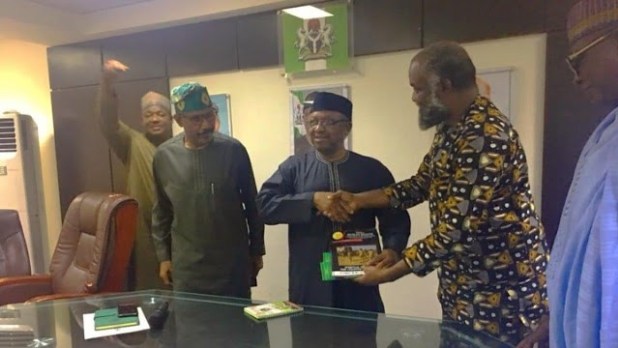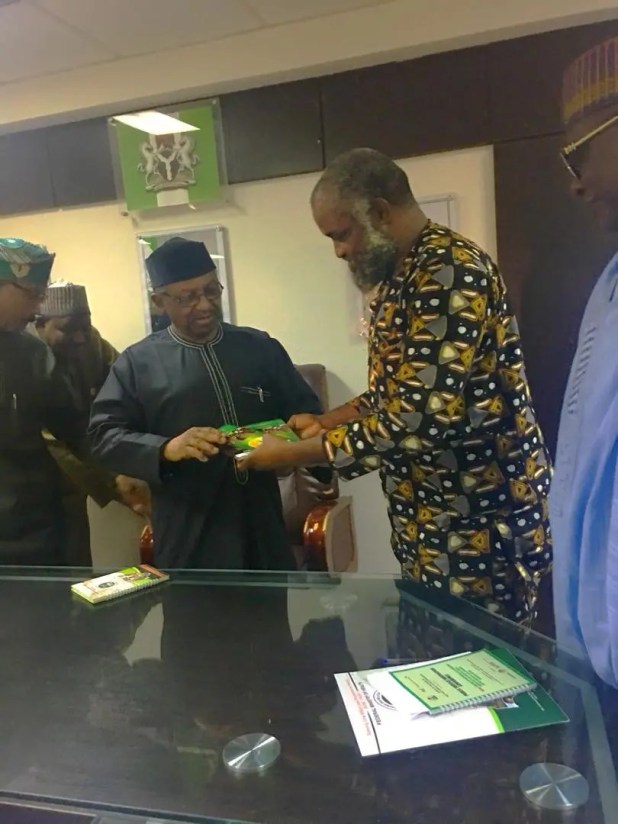
Article 3 of the universal declaration of human rights says “everyone has the right to life, liberty and security of person.”
Closely following this international precept of human right is the section 33(1) of the Nigerian constitution which guarantees right to life.
The provision contained in that specific constitutional code goes thus: “Every person has a right to life, and no one shall be deprived intentionally of his life save in the execution of the sentence of a court in respect of a criminal offence of which he has been found guilty in Nigeria.”
Sections 17(3) are more primarily concerned about the health rights of Nigerians.
These sub-sections of the Nigerian constitution states as follows: “The State shall direct its policy towards ensuring that- (a) all citizens, without discrimination on any group whatsoever, have the opportunity for securing adequate means of livelihood as well as adequate opportunity to secure suitable employment; (b) conditions of work are just and humane, and that there are adequate facilities for leisure and for social, religious and cultural life; (c) the health, safety and welfare of all persons in employment are safeguarded and not endangered or abused; (d) there are adequate medical and health facilities for all persons: (e) there is equal pay for equal work without discrimination on account of sex, or on any other ground whatsoever; (f) children, young persons and the age are protected against any exploitation whatsoever, and against moral and material neglect; (g) provision is made for public assistance in deserving cases or other conditions of need; and (h) the evolution and promotion of family life is encouraged.”
Following from the above is the need to state that implementation of public policies in all its ramifications are the functions of bureaucracy and other administration organs of government.
The public policy expert R. K. Sapru made the above points very clear in his authoritative book titled: “Public Policy: formulation, implementation and evaluation.”
He wrote thus: “The principal function of public administration is the implementation of public policies. Public administration has concentrated on the machinery for the implementation of public policies, as given, rather than on making them. In an era when about 2/5th of the Indian work force is employed by government, the functions and roles of government employees determine what happens after a policy, in the form of a law or a statue has been adopted.
The expert said also that Public policies in India, as in other countries, are implemented by a complex system of administrative organizations and agencies.
They perform several activities.
What this means is that the day-to-day running of these enterprises becomes a matter of wide public concern.
The main agencies which are implementing government activities and public policies are as follows:
Bureaucracy and other Administrative Organizations.
RK Sapru defines these institutional organs that implements public policies ss follows: “The bureaucracy is an executive branch of the government. It is an administrative organization consisting of a legal body of non-elected employed officials which is organized hierarchically into departments in accordance with the rules governing the conditions of their service.”
Bureacracy he argues rightly is an important institution which performs most of the day-to-day work of government.
It is the bureaucracy who controls the personnel, money, materials and legal powers of government, and it is this institution that receives most of the implementation directives from the executive, legislative and judicial decision-makers, he affirmed.
The author said something of interest to us in this piece when he reminds us that it is a question of controversy whether the bureaucracy is strong enough to dominate the political elite or vice versa.
He then added that however, bureaucracy has never been a popular word. It is said to be afflicted with excesses of red tape, tedious rules and an attitude of unresponsiveness.
Despite its maladies, it is important because implementation is the continuation of policy-making through means, he averred.
These basic foundations is necessary so as to properly focus on the thematic area of our piece which came about by a certain news story in The Guardian few days quoting the health minister as planning to import medical doctors to Nigeria as a way of checking medical tourism.
This news story instigated and ignited a groundswell of disturbing signals in the organized human rights community particularly because if it is indeed true that after over half a century that Nigeria became an independent nation that we are still relying on foreign medical doctors to work in our public health institutions and indeed the bureaucrats in this government would come up with such a weird public policy , it therefore means that Nigeria has returned to square one.
The HUMAN RIGHTS WRITERS ASSOCIATION OF NIGERIA therefore undertook an interface with the Health minister Dr. Osagie Ehanire and his minister of state Senator Oloruninmbe Mamora to hear from them the real position and also to demand accountability from them on what the Federal government has in the pipeline to ensure the delivery of the right to qualitative healthcare to Nigerians.
From the totality of what the two ministers told us during the two hours meeting, there is nothing that shows that President Muhammadu Buhari’s administration is planning to impart foreign doctors. Here are their words so you judge for yourself.

The Honorable Minister of Health said thus: “As you know we are in the period of budget defence and the various committees of the house invite all the Ministers to come and make submissions to them and while we were having the submission with the committee on Diaspora, Diaspora are those Nigerians who work outside the country and some of them do come here. The doctors and nurses and pharmacies among them gather to work here, we cooperate with them and they corporate with us. And in the course of asking about diaspora doctors and about medical tourism, the committee members asked those questions, we answered that yes we do work with the Nigeria diaspora doctors they come from abroad for 2weeks, sometimes 3weeks, 4weeks, one week depending on how much time of leave they have, because they are working over there. So they use their leave to come home to work. As far as medical tourism is concerned we need also to improve our health delivery by looking for people who have experience from outside the country who have perhaps retired and who are looking for somewhere to volunteer to spread their experience and their knowledge. If they could come here, work in our teaching hospitals to also share their experience. Because there are some very experienced people who have worked retired and some of them are still strong and they don’t know what to do want to go volunteer and work somewhere else to share their experience among those who are coming up that we shall also be happy to engage those in fact we are in discussion with some of the embassies to see if they can help us to find some of those people and perform particularly difficult operations which we are not able to do here. They are such operations that we don’t have either the equipment or maybe because the expertise or maybe very seldom operation where in some cases we actually infact justifiably have to send few cases abroad because we cannot do it here, so they can come and share their experiences with us. That’s what we said, and then the next thing was that it took a different turn that we are importing doctors.
Well first of all, let me tell you that Nigeria doesn’t have money to import people because it’s difficult not paying salaries here so where are we going to see the money to go and import doctors from American or from anywhere, do we have the money? There is a lot of expenses here that the government has to meet and you hear sometimes doctors and workers go on strike because of their salaries are owed here. Is that the time to be importing doctors?
It does not make sense; we are talking about people volunteering. What we want to import is not doctors but we want to import their knowledge and skills. Who would come here volunteer to work in may be in UBTH, Lagos Teaching Hospital, LUTH, National Hospital, Ahmadu Bello University, and University of Nigeria Nsukka, Ibadan and these experienced Professors from abroad, from America, Germany, Uk, England, France will just work for about 2, 3 months to take care of them they are volunteers because they have their pensions, and there is nothing they are looking for again other than to find a way to also share their experience and give their experience to our own expertise so that they can be stronger and better. That is the story we gave to the committee that’s it and it started going a different way so we called them and said this was not what happened and as far as am concerned my door is always open l talk to people who always come and ask for interviews who we give them interviews, so if you have been able to make a phone call or ask a question you would have been given a scenario of what happened , the point is that we don’t even have money to pay the salary of any expatriate coming. Nigerians won’t even have the money and that was not the thinking or even the words that were used. The words that were used are that we are looking for volunteers. Do you pay for volunteers? No you don’t and that the volunteers will come and they must be experienced not just any other person who will be able to add value so that people will have more confidence in this system and they would not want to go and get treatment outside. That is the way the story went. So for those of you who have heard now yes.
1-it is not even on our budget to be able to bring foreign doctors to come. If it is not in the budget so why will anybody say they are bringing doctors.
2-Secondly, we need their knowledge, we need their experience, we need their expertise and some of them have also learnt, I mean they have new technology that they can also show us here because medicine is a science that is constantly improving and changing. And those people who are retired and they have all this knowledge and expertise can come here and show us the latest in approach to treatment, to operations and to managing patients, so that was the story and now you know it.
We agree with you that the health sector in Nigeria requires repair that is what the president has been saying over and over again that he took over this country in a very difficult time where people in the past government believes that when you talk about health, you build big hospitals inside the city that everybody can see and say this man is working. But in the village where nobody there is nothing. So since president Buhari came, his idea is to balance this thinking if you are in the big town, ok you can have big hospital, if you are in the small town then you can have small hospital. So that’s why we are developing primary health care so that you can give health care to people in the rural area also, in the village, in the remote areas in hamlets even if it’s just a small primary health care with 5 or 6 people, they can have something and his policy is to have at least one primary health care centre in every ward if the ward is big or population is very big you can have two or even three but you must have one minimum in every ward that will give about nearly [10,000] ten thousands which we have been working on, infact one group just left before you became an NGO that receives support to help us with this primary health care centres. Since we announced it, many foreign friends have been very happy they said yes now you are doing something about the poor people we will support you. So this particular group has renovated about 1,000 one thousands primary health care centre in Nigeria. And that’s exactly the kind of example we are looking for so when we are talking about foreign people well, they can help us in many ways because some of them have money, the expertise, the technology and what this people are doing now helping to renovate and take health care to the rural areas. We have done more than half or about half of the number we are looking for. And we are also going to continue those health care centres. You asked a question about who is in charge?
Well Nigeria operates according to constitution. Who is in charge of primary schools? It is supposed to be local government. Who is in charge of secondary schools? It is supposed to be state government. And who is in charge of University? It is supposed to be the federal government. That is the way the constitution actually divides it. And in the same thing, in health care local government is actually supposed to be responsible for primary health care but they are not strong you are correct. They are not strong and the general hospital does actually what the state government should be doing but what the federal has to do. And you said the only ones working are the big hospitals in the city, the teaching hospitals you are correct. So the result is that anyone who has transport fare coming from the village, coming from everywhere and crowding the teaching hospitals and federal medical centres. They have to do all the out patients, treat everybody cough, catarrh, backache and waist pain which normally can be taken care of at primary health care level. Malaria, waist pain, even deliveries, many deliveries, diarrhea, stooling, all those are things that can be done in primary health care so that people will not waste their transport fare and those who have no transport fare and those who do not have transport fare will not lose their lives. That is why we are taking health care to all rural areas .If we have primary health care centre, you can also have health posts in different villages where people can at least get advice or get a few tablets for their ailment that is the plan and for the secondary level, the general hospitals again, the states were not really doing that. Some of them were building big hospitals like tertiary, which the federal government has already done. So that is the area we should believe the private sector will be very important because those doctors who are building their own hospitals may be 20, 40, 50 beds and they are able to perform some operations and employee other doctors, they are now like general hospitals .Some of the private hospitals so those ones will fill in gap for the secondary health care part of it and then be able to have a place where the people who cannot be treated in the primary health care can be referred to. As you know we are also working on National health insurance scheme to be able to have people contribute maybe when you begin to hear of it you will join too because you are supposed to contribute Health Insurance Scheme when you are well so that you will make it a monthly contribution, so that any day you fall sick nobody will ask you to come and pay money again because you already have a card that says you are a contributor and being a contributor is like being a member of a hospital where you can go and get treatment because you are paying. It is like a membership fee which is what they do all over Europe they do it in many of those countries and we should be doing it here too. The law is about to be passed out to allow the National Health Insurance Scheme to expand and make it mandatory for people to join so yes I agree with you that there is a right to health, but to have the right the right to health you must have the health facility there, and it’s the Federal Government that is now going in to put money and put resources for Primary Health Care because at the end of the day, the federal government feels responsibility for all citizens we won’t say we are sorry, local government take care of yourself because local government, the constitution has left them weak and unable to do those things that are expected of them. As equipment concerned well people stay outside and say the hospital has no equipment nobody has really gone to examine, have you gone there to examine? NO you haven’t. The point is that yes it is true that they are some that they don’t have the equipment they want, there are some of that have equipment that are in need of repair, but there are good number that have good equipment, equipment that work and are functioning. So those ones too we expect better performance from them. While we are trying to have a better strategy for either repairing our equipment or how to buy equipment because yes equipment are extremely expensive we don’t make them. They all have to be important and some of them are millions and even millions of dollars and to have them is not easy at all, so we are in need of a strategy to be able to get all the equipment that we need perhaps helping the private sector, everybody has money for example, if you have money and you want to invest money in the health sector, we encourage you to come, you can build an x-ray centre in the hospital and you can be charging that’s private sector joining where government cannot supply the whole of 36 states the whole of 774 local government and the whole 9,844 wards federal government alone is not able to take care of all of those so we are looking for participation from private sector which are very much interested in. As far as complain about service is concerned , most hospital who have servicom points where you can go and complain if you have any issue that didn’t appeal to you, you make your complain, I myself received petition when people have been to hospital they were not happy.
They write letter complaining to me, i will investigate if a doctor didn’t treat them right or the nurse abuse them they will set up a committee to go and find out and then discipline the person, so yes complains we are waiting. Infact we welcome complain so that we can correct people who are not doing the right thing. If you keep quiet, we will never know who is doing it well and who is not doing it well, so for interface, you can interface with us, anybody here that you know. But the chief person here is the deputy media director who has her own team, she can speak to you anytime. Infact she brought somebody to interview us this morning, so you are not blocked off. That we are attending only to doctors, that is not true we attend to anybody who wants to know because it is the people’s ministry, we just work here and it’s yours. So that’s the way the story went about importation of Doctors as you said just now let me repeat:
A. We didn’t have in our budget to import anybody, so nobody could be importing a doctor and secondly, we didn’t need to import anybody and thirdly, what we want to import is skills and knowledge from volunteers. Volunteer because we know we cannot pay them. We can’t pay so, it is only people who are interested who have these knowledge and skills from outside the country, from modern world and they want to help us. We appeal to them that come if can spend about three (3) months, six (6) months we can give food and water and a place to stay and they teach our experts to know more and have more skills.
The Honorable Minister of State added the following: “Comrade let me thank you and your team for finding time to see us. I will say without mincing that every expectancy in respect of the news that was very unfortunate because nothing was said that way to even be misconstrued in that regard by anyone not the minister, not myself not anyone that had privilege of making any comment on that day.
And the question to ask is, if truly that kind of thing was even contemplated and shared. That was a major news item why is it that it’s only just one paper that carried it, in front page? That’s the question. Such a news item that carries such weight, if it was true why would it be that one paper would carry it. Not a side news but front page headline. I felt disappointed really, I must be frank because a number of my friends locally and internationally called me and were asking .So no iota of truth in that publication and its quiet unfortunate coming from that stable. So we must think. Even if we make mistakes we must be ready to accept our mistakes but it should not happen. The constitution gives a specific room to media as partners in governance process but every right I must say, every right has a commensurate responsibility attached to it.
There is no right that is absolute, every right is qualified and has responsibility attached to it even the right to health that you are talking about. We have a righto health but if you continue to abuse your health, through alcohol abuse or cigarette smoking and all that, I mean nobody would but you would just be told these things are dangerous to your health. But if you fail to do what is right, in terms of responsibility that you have then there is a limit. So am saying that as much as we appreciate and welcome journalist, media people as partners for good governance, we need to be careful with what we push out and as you said in regards to that first news going out there, a lot of people may not even get to read the re-rejoinder, and they will just go on . It’s unfair we shouldn’t and whoever wrote that story had the opportunity to cross check. I always say, the basic principle of justice is to hear from the other side.
That’s the basic concept of justice so please I’m happy that you are here by virtue of what you do as the Guardian of Human Rights. I think our own right at the Ministry too has been violated through that publication. That’s the truth it’s not fair, if we are wrong we would apologise so i don’t know what the motive could have been but I must say that it is not right. Then the other thing is that the current leadership in this Ministry will engage you on regular basis so that you can have the opportunity to issues that bothers you particularly that has to do with national interest which we are all here to protect so we will have regular engagements as much as time permits .
So that issues that have to do with health can be discussed and you can have the position of the Ministry. That’s what we intend to do and that would be established in due course. And finally is to say that we have never claimed that we can do it alone as officials of the Federal Ministry of Health so we welcome this partnership as much as possible we will also try to be proactive so that we can all be on the same page on issues that concerns health in our country.”

You may be interested

Arsenal Equal Chelsea’s London Derby Feat After 5-1 Win Vs Palace
Webby - December 21, 2024Arsenal equaled Chelsea’s London derby achievement following their 5-1 win against Crystal Palace in Saturday’s Premier League game at Selhurst…

Haaland Backs Guardiola To Turn Man City’s Poor Form Around
Webby - December 21, 2024Erling Haaland had said he and his Manchester City teammates are still backing manager Pep Guardiola to turn the team’s…

PSG To Reignite Interest In Osimhen
Webby - December 21, 2024Paris Saint-Germain have contacted Napoli to discuss signing Victor Osimhen in January, according to reports in France.It is reported that…


![VeryDarkMan Accuses Reno Omokri Of Allegedly Suppressing Brother’s Rαpe Case [Video]](https://onlinenigeria.com/wp-content/uploads/2024/04/verydarkman-accuses-reno-omokri-of-allegedly-suppressing-brothers-rceb1pe-case-video-300x157.jpg)
![Confusion As May D And Uche Maduagwu Engage In Physical Fight Publicly [Video]](https://onlinenigeria.com/wp-content/uploads/2024/04/confusion-as-may-d-and-uche-maduagwu-engage-in-physical-fight-publicly-video-300x150.jpg)

















![American Pastor, David Wilson Seen Eating The Box Of Woman Who Isn’t His Wife [Video]](https://onlinenigeria.com/wp-content/uploads/2019/10/american-pastor-david-wilson-seen-eating-the-box-of-woman-who-isnt-his-wife-video-150x150.jpg)









